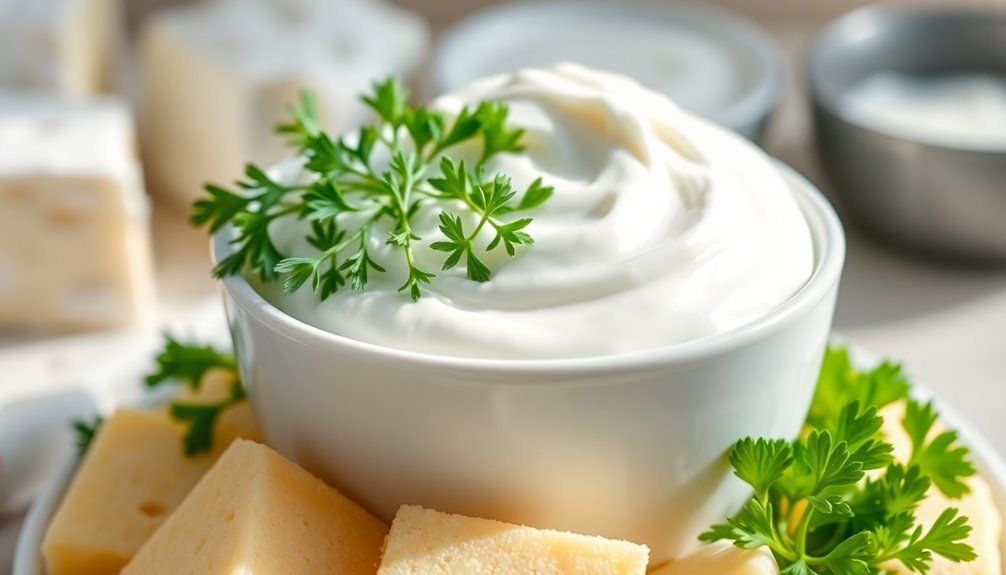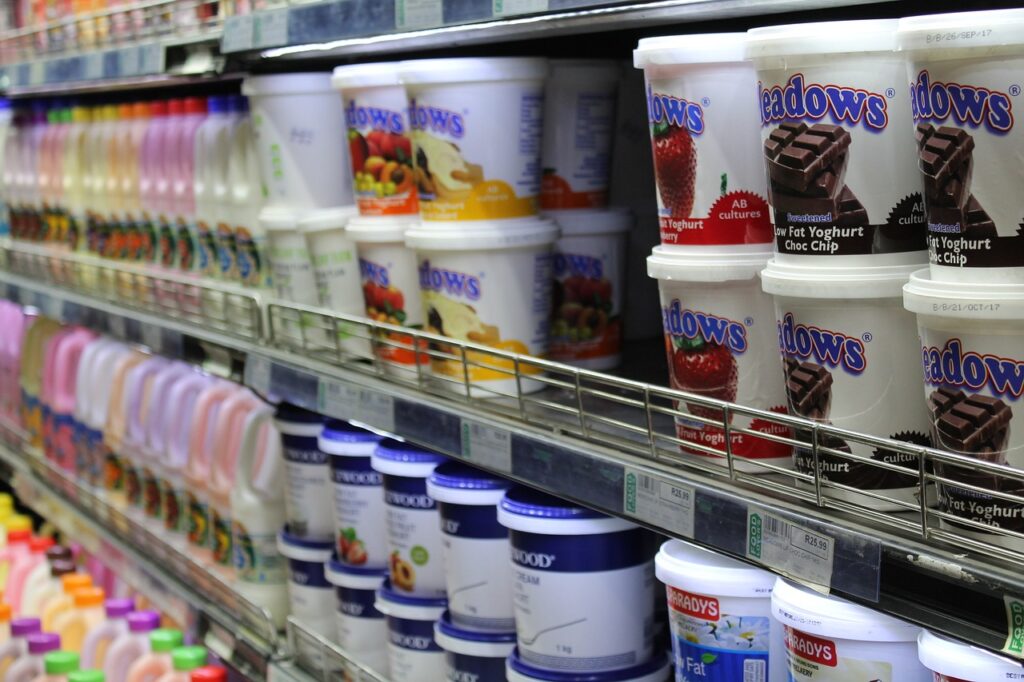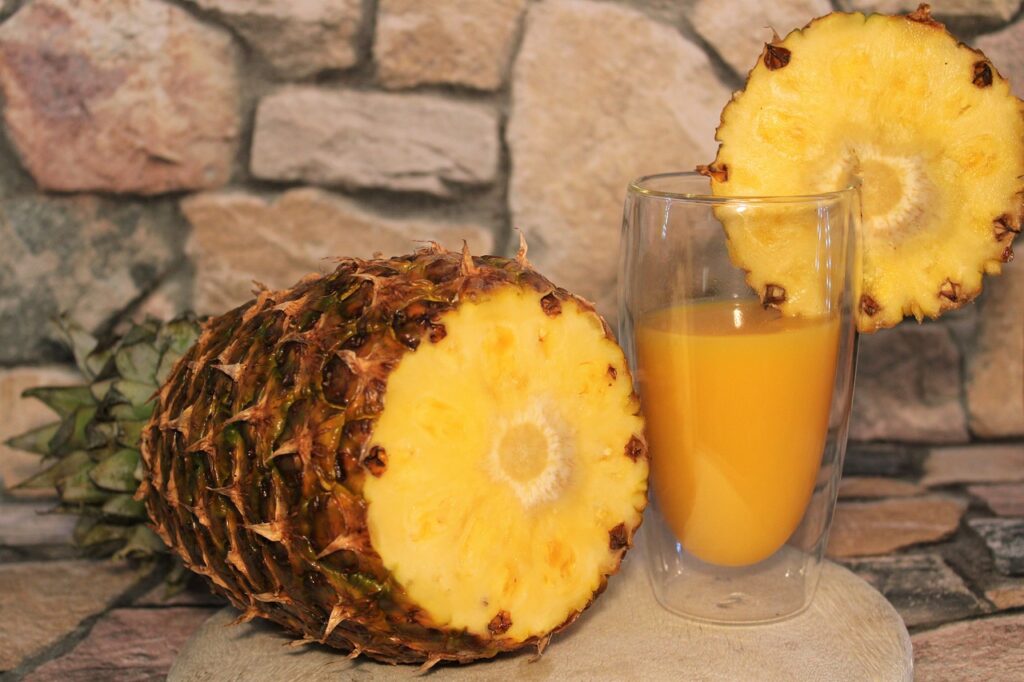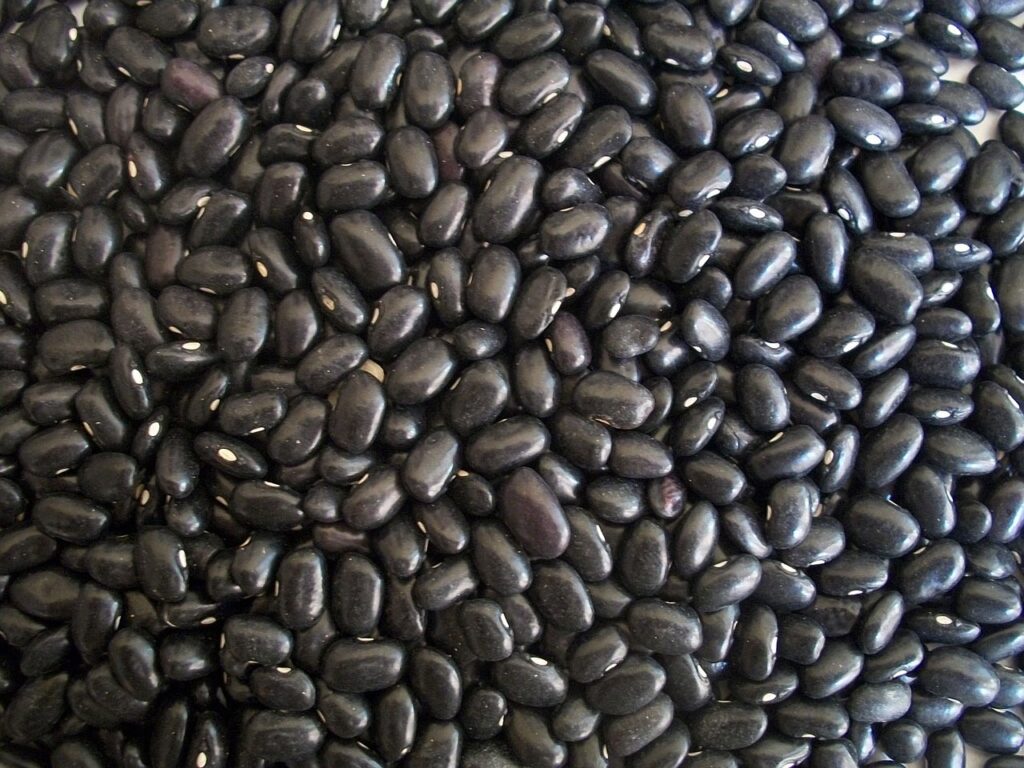Yes, sour cream is keto-friendly! With around 18% fat and just 5.56g of net carbs per 100g serving, it perfectly fits your low-carb diet. Opt for full-fat sour cream, as low-fat versions often contain extra carbs from added sugars. Use it to enhance soups, sauces, or even as a creamy base for low-carb sides. Just remember to monitor your portion sizes to stay within your carb limits. There are also plant-based options and other dairy choices that can complement your keto regimen. Keep exploring to find more delicious and keto-friendly alternatives you can enjoy!
Is Sour Cream Keto?
When you're following a keto diet, you might wonder if sour cream fits into your meal plan. The good news is that sour cream is a fantastic option. It's high in fat, with approximately 17.99g of fat per 100g serving, making it very compatible with your keto needs.
Plus, it only contains about 5.56g of net carbs per 100g serving, which means it can easily fit within your daily carbohydrate limits. To reap the most benefits, stick with full-fat sour cream. Low-fat or nonfat versions typically have higher carb content and should be avoided if you want to maintain ketosis. Additionally, full-fat dairy products are essential for keeping satiation and providing nutrients, particularly because they offer better nutrient profiles than their lower-fat counterparts.
Another perk of sour cream is its fermentation process, which provides beneficial probiotics, perfect for those who aren't lactose intolerant. Additionally, sour cream can be paired with keto-friendly foods to enhance both flavor and nutrition in your meals.
However, always check nutrition labels when purchasing sour cream. Some brands may add sugars or stabilizers that could throw off your keto diet.
Nutritional Profile of Sour Cream
Sour cream packs a nutritious punch, making it a great addition to your diet, especially if you're on keto. With about 20 calories per tablespoon, it's low in calories while providing essential nutrients. The nutritional profile of sour cream reveals around 1.5 grams of carbohydrates per serving and approximately 2 grams of fat, mainly saturated fat. This makes it keto-friendly, but you'll want to be mindful of portion control.
In a 100g serving, sour cream contains roughly 5.56 grams of net carbs, which is significant when you're trying to maintain ketosis. Opting for full-fat sour cream, which has at least 18% milk fat, helps keep your fat content balanced. Be cautious with low-fat or nonfat versions, as they often have higher carbohydrate content due to added ingredients. Additionally, consuming sour cream in moderation can help maintain heart health by providing essential nutrients without excessive calories. Incorporating full-fat dairy products into your meals is also beneficial for a ketogenic diet.
Additionally, sour cream is a good source of calcium, providing about 107.2mg per 100g serving. It also includes essential vitamins and minerals such as B-6, B-12, niacin, and retinol, contributing to your overall health. Incorporating sour cream into your meals can complement healthy oils and fats that are beneficial for a ketogenic diet.
Enjoying sour cream in moderation can add flavor and nutrition to your keto meals.
Types of Sour Cream
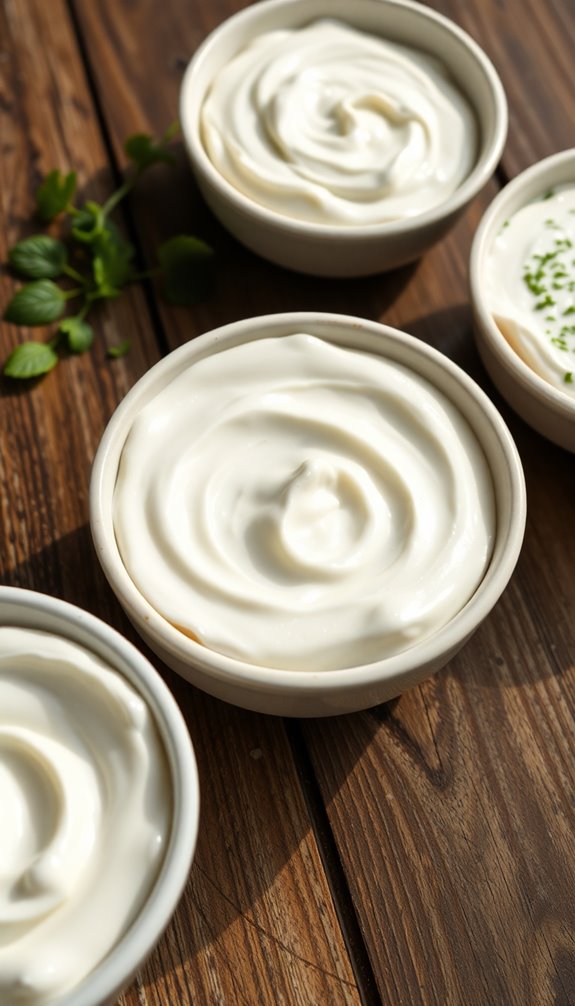
When choosing sour cream for your keto diet, it's important to understand the differences between full-fat, low-fat, and plant-based options.
Full-fat sour cream is your best bet, while low-fat and nonfat varieties often come with higher carbohydrate counts. Incorporating high-fat dairy into your meals can further support your keto goals, as healthy fats are crucial for maintaining ketosis and overall energy levels.
If you're considering plant-based alternatives, just make sure they don't have added sugars or preservatives that could throw off your carb balance. Additionally, opting for keto-friendly dairy products can enhance your overall dietary experience while supporting weight loss goals.
Full-Fat vs. Low-Fat
Many people wonder about the differences between full-fat and low-fat sour cream, especially when following a keto diet. Full-fat sour cream typically contains at least 18% milk fat, making it a keto-friendly choice. With approximately 5.56g of net carbohydrates per 100g serving, it supports your efforts to maintain ketosis.
On the other hand, low-fat sour cream often has a higher carb content due to the removal of fat. When fat is reduced, many brands add sugars and stabilizers, which can increase the carb content, making low-fat options less suitable for your keto lifestyle.
In fact, light sour cream can include emulsifiers that may negatively impact gut health, further diminishing its appeal for strict keto adherents. For ideal keto compliance, you should prioritize full-fat sour cream over low-fat alternatives.
The higher fat content not only correlates with lower carb levels but also helps you meet your daily fat intake requirements. So, when you're shopping for sour cream, remember: full-fat is the way to go if you want to stay on track with your keto diet!
Plant-Based Alternatives
If you're exploring plant-based alternatives to traditional sour cream, you'll find several options that can fit into your keto lifestyle.
Many plant-based sour creams are made from coconut oil or other high-fat plant oils, which are rich in medium-chain triglycerides (MCTs). These MCTs are beneficial for a keto diet since they're quickly absorbed by the liver and converted into ketones, providing a primary energy source during ketosis.
When choosing plant-based sour creams, it's essential to read the nutrition labels. Some products may contain added sugars and unnecessary fillers that can spike the carb content, making them less keto-friendly.
Look for options specifically designed to replicate the creamy texture of dairy sour cream, as these can be versatile for dips, dressings, and sauces.
If you prefer a DIY approach, consider making homemade plant-based sour cream. You can blend ingredients like cashews or tofu with lemon juice and vinegar to create a creamy alternative without added sugars or preservatives.
This way, you can enjoy a delicious, keto-compatible sour cream that aligns with your dietary goals.
Plant-Based Sour Cream Options
If you're exploring plant-based sour cream options, look for those made primarily with coconut oil. This ingredient is rich in medium-chain triglycerides (MCTs) that can support your keto journey. Just remember to check the ingredient labels for any added sugars or stabilizers that could throw off your carb count. Additionally, incorporating healthy fats into your diet is crucial for maintaining ketosis and overall health. Plant-based alternatives can also provide nutrient-dense options that enhance the nutritional value of your meals. Many of these options can be enhanced by including omega-3 fatty acids, which are beneficial for heart health and reduce inflammation.
Coconut Oil Benefits
While exploring plant-based sour cream options, you'll find that those made with coconut oil not only fit well into a keto diet but also offer numerous benefits. Coconut oil is high-fat and low carbohydrate, making it a keto-friendly choice that aligns with your dietary goals.
One of the standout features of coconut oil is its medium-chain triglycerides (MCTs). These MCTs are rapidly absorbed by the liver and converted into ketones, providing you with an efficient energy source, especially essential when you're on a keto diet.
Additionally, plant-based sour creams that use coconut oil or palm oil deliver a creamy texture, enhancing the flavor and richness of your dishes. This versatility makes them a fantastic ingredient in your keto recipes.
By incorporating coconut oil-based sour creams into your meals, you can maintain your low-carb lifestyle while enjoying delicious flavors that mimic traditional dairy products.
Just remember to check for any added sugars or non-keto ingredients when selecting your plant-based sour cream to guarantee you stay in ketosis. Enjoy the benefits of coconut oil while keeping your dishes rich and satisfying!
Checking Ingredient Labels
Regularly checking ingredient labels is vital when choosing plant-based sour cream options, especially on a keto diet. You need to be vigilant about added sugars, as they can greatly increase carbohydrate content and jeopardize your keto compliance.
Opt for plant-based sour creams made from coconut oil or palm oil, since these often contain medium-chain triglyceride (MCT) oils that can support ketosis.
While exploring your choices, pay close attention to the nutritional profile, which can vary widely among brands. Always compare the fat and carb content per serving against your daily keto goals.
Be cautious of marketing claims too—just because a product is labeled "plant-based" doesn't mean it's low in carbohydrates, so diligent label reading is imperative.
Additionally, some plant-based sour creams may include stabilizers or emulsifiers that could harm your gut health. It's best to select options with minimal additives to guarantee you're supporting your overall wellness.
How to Use Sour Cream
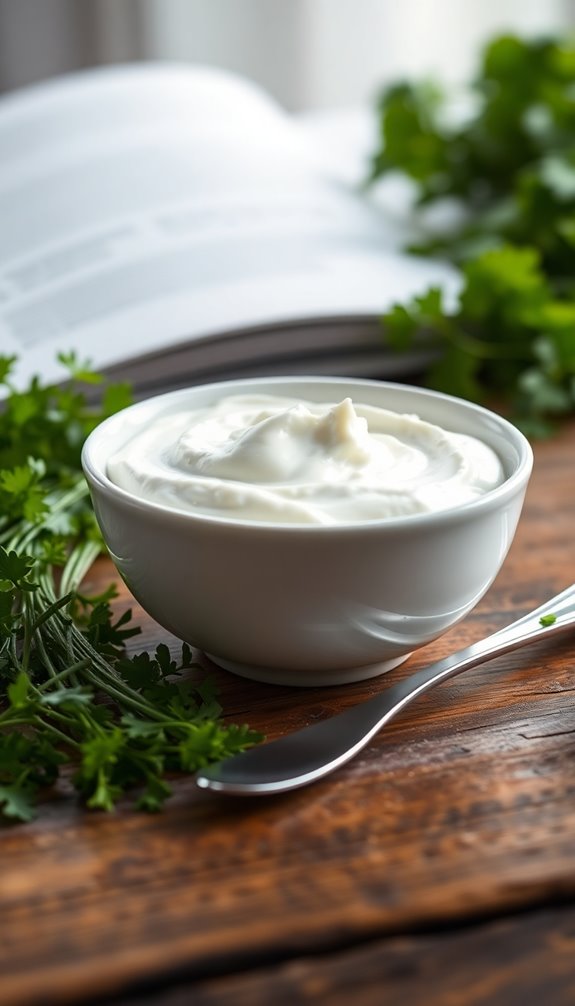
Sour cream is often a game-changer in the kitchen, adding richness and creaminess to a variety of dishes. You can use it to thicken soups and enhance sauces, creating a creamy texture without greatly increasing carb content. This makes sour cream a fantastic choice for your keto-friendly recipes.
It also serves as a delicious dip for low-carb vegetables, perfect for snacking while staying on track with your diet. If you're marinating meats like chicken, incorporating sour cream can elevate the flavor and keep your dish keto-friendly.
Another great way to enjoy sour cream is by blending it into steamed cauliflower. This creates a creamy, low-carb alternative to mashed potatoes, allowing you to enjoy the richness without the carbs.
When baking low-carb treats, adding sour cream can enhance moisture and flavor, resulting in a more satisfying texture. Additionally, using sour cream in your recipes can provide healthy fats that support your ketogenic diet.
With its low-carb profile and versatility, sour cream is an excellent addition to your keto kitchen. Just keep an eye on the nutrition facts to make sure you're using it in moderation, and you'll make the most of this creamy ingredient.
Sour Cream in Keto Recipes
Incorporating sour cream into your keto recipes can elevate your meals with its rich flavor and creamy texture. Full-fat sour cream, containing around 20% milk fat, is a fantastic choice due to its high-fat and low-carb profile. You can easily blend it into low-carb baked goods or use it as a creamy base for dips, ensuring you stay within your daily carb limits. Additionally, it's important to note that sour cream is low in carbs, making it an excellent addition to your keto pantry.
Sour cream also works wonders as a thickener for soups or sauces, providing a velvety consistency without adding significant carbohydrates. When you use it in marinades for meats like chicken, it not only adds moisture but also enhances flavor, keeping your dish keto-friendly. Additionally, incorporating sour cream into your meals can complement keto fish tacos, adding a delightful creaminess that pairs well with the fresh toppings.
However, it's essential to monitor your portion size when using sour cream. Even small amounts can impact your daily carb allowance on a strict keto diet, so be mindful of how much you add.
Health Considerations of Sour Cream
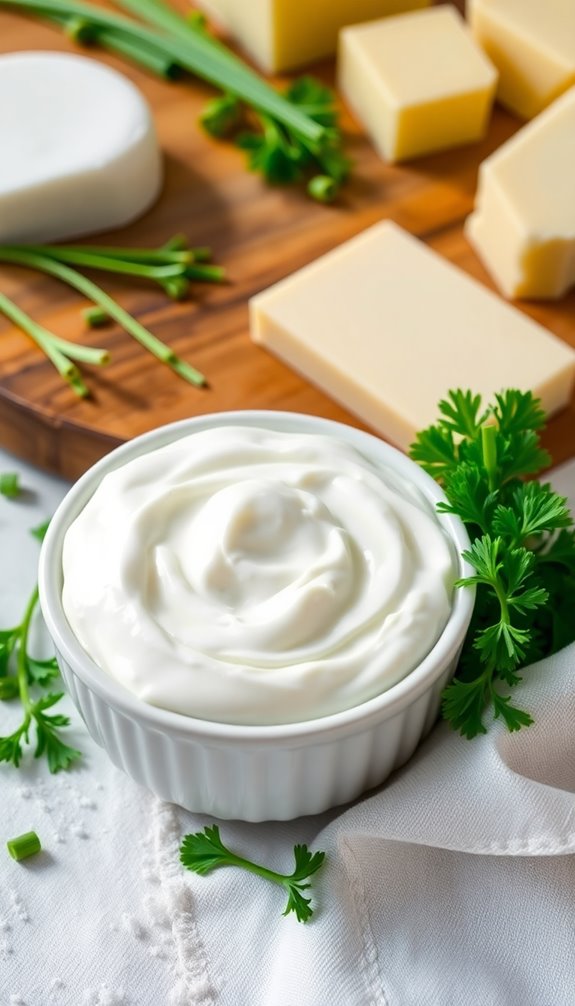
When considering sour cream in your diet, it's important to weigh its health implications. Sour cream can be a keto-friendly option due to its low carbs per serving, containing about 5.56g of net carbs per 100g. However, you should pay attention to its high saturated fat content, which stands at approximately 10.7g per 100g serving. Excessive consumption may raise LDL cholesterol levels, so balance is key.
Additionally, sour cream offers essential nutrients like calcium and vitamin B12, which support bone health and nerve function, respectively.
But if you're lactose intolerant, be cautious. The lactose in sour cream can lead to digestive issues, making it necessary for you to either limit or avoid it altogether.
Dairy on a Keto Diet
Dairy can play a significant role in your keto diet, but it's important to choose wisely. When selecting dairy, focus on low-carb, unsweetened options to help maintain your carb intake and avoid hindering ketosis.
High-lactose products, like sweetened yogurts and flavored milks, can disrupt your progress due to their elevated carbohydrate content, so steer clear of those.
Instead, opt for high-fat dairy choices, such as hard cheeses, butter, and full-fat cream. These options aren't only low-carb but also high in fat, making them perfect for your keto lifestyle.
Remember, portion control is essential when consuming dairy. Even keto-friendly options can add up, so keep track of your servings to stay within your daily carb limits.
Regularly reading nutrition labels on dairy products is important. This practice helps you understand the carb content and make informed choices that align with your keto goals.
Pros and Cons of Dairy

Understanding the pros and cons of dairy can help you make better choices on your keto journey. Dairy foods, like sour cream, are rich in fat, which aids in satiety and digestion—important for maintaining ketosis. They provide essential nutrients such as calcium and vitamin D, supporting overall health on a low-carb diet.
However, keep in mind that dairy contains lactose, which can convert to glucose and potentially disrupt ketosis if consumed in excess. Certain dairy products, like sweetened yogurts and soft cheeses, may have higher carbohydrate content, risking your daily limits on a strict keto plan.
It's important to monitor your intake and choose low-carb options. Moderation is key, as consuming excessive amounts of high-saturated fat dairy can elevate LDL cholesterol levels, which may impact your heart health.
If you're lactose intolerant or prefer plant-based options, numerous dairy-free alternatives are available. These options can still fit into your keto diet without causing digestive issues.
Monitoring Carb Intake
Monitoring your carb intake is essential on a keto diet, especially since sour cream can contribute to your daily limits.
Practicing portion control and keeping track of what you eat will help you stay within the 20-50 grams of carbs recommended for ketosis.
Portion Control Importance
Portion control is essential when adding sour cream to your keto diet, especially since it packs about 5.56g of net carbs per 100g serving.
If you're not careful, those carbs can add up quickly and impact your daily carb allowance. To maintain your keto goals, consider smaller servings, like 50g, which can fit into your meals without exceeding typical carb limits.
Monitoring portion sizes helps you manage your overall carb intake effectively.
Regularly checking the nutritional labels of sour cream products is important to avoid hidden sugars that could derail your efforts.
Carb Tracking Strategies
Tracking your carbohydrate intake is essential for staying in ketosis on a keto diet. You should aim for about 5-10% of your total calories to come from carbohydrates, roughly translating to 20-50 grams of net carbs daily. To effectively manage this, consider using carb tracking strategies such as food tracking apps. These tools can provide nutritional information and help you log your daily food intake accurately.
Pay close attention to serving sizes, as even keto-friendly foods like sour cream can add up. For example, a 100g serving of sour cream contains approximately 5.56g of net carbs, which can quickly impact your daily limit. Always read nutrition labels carefully to spot hidden sugars and added carbohydrates in processed foods to guarantee they fit your keto goals.
Additionally, keeping a food diary can be a game-changer. By recording your meals and snacks, you stay accountable and make informed decisions about your carbohydrate intake.
This habit not only helps you track your progress but also gives you insights into what works best for your body, making your keto journey smoother and more sustainable.
Alternatives to Sour Cream

When you're looking for alternatives to sour cream, several options can fit seamlessly into a keto diet. Greek yogurt is a great choice if you opt for the unsweetened variety; it offers lower fat and higher protein while keeping carbs in check.
Cream cheese serves as a rich, creamy substitute in recipes, maintaining the high-fat content that aligns perfectly with keto needs.
Cottage cheese, particularly low-carb types, can mimic the texture of sour cream and can be blended for extra creaminess, making it versatile for various dishes.
If you're aiming for a dairy-free option, avocado or guacamole provides a delicious, plant-based alternative packed with healthy fats, allowing you to enjoy a creamy texture without dairy.
Lastly, nut-based creams made from cashews or almonds can also be excellent substitutes. Just be sure to check for any added sugars to guarantee they remain keto-friendly.
With these alternatives, you can easily keep your meals flavorful and aligned with your dietary goals.
Tips for Choosing Dairy
Choosing the right dairy products can make a significant difference in your keto journey. When it comes to sour cream, always opt for full-fat varieties with at least 20% milk fat. These options are typically lower in carbohydrates than low-fat or nonfat alternatives, which can sabotage your ketosis goals.
Make it a habit to check nutrition labels carefully. Look out for added sugars and stabilizers, as these can increase the carb content and potentially disrupt your keto state. Whenever possible, choose high-quality grass-fed dairy products; they often have better nutrient profiles and fewer unwanted additives.
Portion sizes also matter. Even keto-friendly dairy can contribute to your daily carb limits. For instance, sour cream contains about 5.56g of net carbs per 100g serving, so keep track of how much you're consuming.
If you're looking for dairy-free options, consider unsweetened almond milk or coconut yogurt, ensuring they remain low in added sugars and carbs.
Summary of Dairy Options

Several dairy options can fit seamlessly into your keto diet while providing delicious flavors and textures. Full-fat sour cream is a fantastic choice, offering about 5.56g of net carbs per 100g serving, making it keto-friendly.
However, you'll want to steer clear of low-fat and nonfat sour creams, as they often contain added ingredients that increase carb counts and aren't ideal for strict keto followers.
In addition to sour cream, hard cheeses like Parmesan and Swiss are low in carbs and perfect for snacking or adding to dishes.
Butter is another excellent option, featuring zero carbs and high healthy fats. Greek yogurt can also be included, but be sure to choose varieties with lower carb content.
Cream cheese is another versatile dairy option that maintains a creamy texture in your recipes while fitting into your keto lifestyle.
Conclusion
To sum up, sour cream can be a tasty addition to your keto diet, much like the cherry on top of a sundae. With its low carb content and creamy texture, it fits well into various dishes. Just keep an eye on portion sizes and explore alternatives if you're looking for something different. By choosing keto-friendly dairy options, you can enjoy delicious meals while sticking to your dietary goals. Immerse yourself and savor the flavors!

